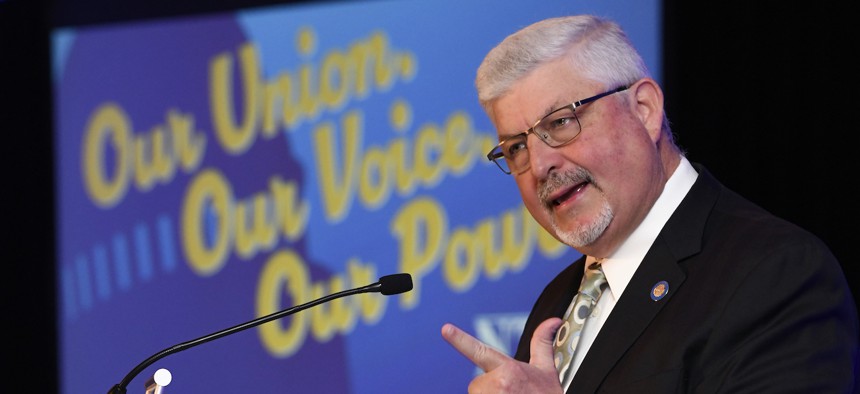
Outgoing NTEU President Tony Reardon said he believes federal employee unions learned a lot from the Trump era. NTEU
Retiring NTEU president reflects on three decades in organized labor
Tony Reardon on Thursday handed the reins of the National Treasury Employees Union to newly elected national president Doreen Greenwald.
After two four-year terms as national president of the National Treasury Employees Union and more than 30 years working for the labor group, Tony Reardon is calling it a career.
“I’m truly retiring,” he said. “People say, ‘Oh, you’re only 59 years old, what are you doing?’ But you know what, I say that I’m retiring, and in terms of work I am, but I’ll be doing some things I want to get involved in like political things. I’m not running for office or anything, but whether I can help with operational things there or giving speeches for people about their campaigns, that kind of thing.”
A third-generation labor leader, Reardon has guided NTEU through one of the more tumultuous times for labor and the federal workforce in recent memory. Although years of work as an employee of the union acclimated him to the to-and-fro of labor relations at federal agencies that often corresponds with changing administrations, the Trump and Biden administrations corresponded with an escalation of that phenomenon.
“You clearly had a change from Clinton to [George W.] Bush, and then another from Bush to Obama,” Reardon said in a July interview with Government Executive. “But the pendulum changes from Clinton to Bush to Obama were not quite as significant as the ones we then saw from Obama to Trump and then from Trump to Bidne. So what I’ll tell you is that from my perspective, what it suggests to me is that the amount of the partisan divide that this country has experienced over the last six to eight years is growing, and the significance of the partisan divide that took place certainly during the Trump administration has really exacerbated this problem.”
The Trump administration took a take-no-prisoners approach to labor-management relations. In 2018, then-President Trump signed a trio of executive orders aimed at making it easier to fire federal workers and severely restricting unions’ influence on their agencies’ workforce policies. Agencies in many cases either declined to bargain over policy changes with their labor counterparts, or they rushed negotiations to impasse so that the Federal Service Impasses Panel, which largely imposed a series of pro-management contracts on the parties.
And federal workers endured a 35-day partial government shutdown in 2019, causing many feds to miss paychecks and spurring Congress to make reforms to ensure government workers are automatically granted back pay for their time on furlough during any future lapses in appropriations.
President Biden, by contrast, made an early focus of his administration undoing Trump’s workforce policies, as well as directing agencies to take a more collaborative approach to labor relations, particularly instructing them to negotiate over more topics than his Democratic predecessors.
Reardon said he believes federal employee unions—and organized labor writ large—learned a lot from the Trump era, including new ways to effectively advocate and care for their members.
“[The divide between Democrats and Republicans] clearly creates a challenge for any union president,” he said. “One of the things I have really tried to do, and I even tried to do it during the Trump administration, is to let leadership know that: look, I am looking for, and NTEU is looking for, a productive and collaborative relationship. I’m not one of these union presidents that thinks that the only way you can deal with management is to fight them. In fact, I don’t think that’s in anybody’s interest—not the taxpayers’, not the agencies’ and I don’t think it’s in employees’ interest to fight over everything . . . I think that labor and management should sit down and their No. 1 goal should be to problem solve.”
But he acknowledged that on some issues, such as the effort among Republican politicians and staffers to reshape the federal civil service such as Schedule F or otherwise make federal workers at-will employees, the only option is to fight.
“People in this country need to be considerably more alarmed about this happening,” Reardon said. “In my view, it’s a clear threat to democracy, and I don’t think we can lose sight of that. I’m really disappointed that these efforts to dismantle the civil service still exist . . . and I also worry about the disrespect too often shown to federal employees. We’ve obviously got people running for high office right now on platforms focused on firing federal employees, eliminating entire agencies and demonizing people who, remember, have really done absolutely nothing wrong except to swear an oath to the Constitution and carry out the policies set by Congress and the administration.”
One piece of advice he offered for future federal labor leaders to build stable partnerships across administrations is to show agency management all the ways that unions can advocate on their behalf.
“NTEU is always there, pushing for appropriate funding for agencies, making sure staffing is sufficient and if it’s not, pushing for more staffing, and making sure employees have all the tools and resources to effectively do their jobs,” Reardon said. “And we can do that in ways that agencies often can’t. We’re the ones out there telling the stories of the federal workforce and the good work agencies do. Sometimes I’m not sure agencies fully understand the help that NTEU can provide.”
On Tuesday, NTEU elected Doreen Greenwald to succeed Reardon. Greenwald has been the union’s national executive vice president since 2021.







